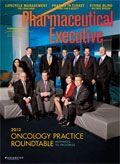In Cancer, Process Drives Progress
Today's most important public health story is the advance in our understanding of the biology of cancer, writes Pharm Exec Editor-in-Chief William Looney.
TODAY'S MOST IMPORTANT PUBLIC HEALTH STORY is the advance in our understanding of the biology of cancer—a disease so deeply associated with major death and disability that the long search for a cure has been framed through the rhetoric of all-out war. What the new science is saying about cancer is something different. Cancer is not that monolithic curse of unrelenting discipline but rather a collection of small—even rare—conditions driven by the distinct characteristics of every individual's inherited DNA. Seen this way, it's probably a stretch to claim that success against cancer requires military style mobilization. In fact, a key question is whether the way we treat and manage cancer is appropriate to its changing scientific profile. Are we ready to leverage our mastery of the genetic codes for cancer with the treatment systems and standard of care that can really deliver personalized medicine to the patient?

William Looney
This month's cover feature provides some thoughtful answers to this question, itself part of a larger dilemma facing the healthcare community. Providers and payers, not to mention patients, are wrestling with the issue of how quickly the practice of medicine, and the often cumbersome process of delivering and financing care, must accommodate to advances in medical innovation. Cancer care is on the front lines of this issue, so Pharm Exec convened a panel of oncology experts—drawn from industry, academia, and the nonprofit sector—to consider ways to balance the sometimes conflicting goals of quality, efficiency, cost, and outcomes in evaluating the growing number of treatment options available to patients.
The group's discussion emphasized the vital role that treatment guidelines and pathways play in providing a semblance of order to the cancer space. Concerns about pricing and costs are beginning to override the cancer community's traditional deference to physician judgment, which makes it more important that therapeutic decisions be grounded on good evidence. The best means to accomplish this is through flexible, independent, physician-led standards linked to consensus-based, transparent metrics around performance; in this latter case, while acknowledging there are choices to be made on costs, the reference point should always be the impact of a particular intervention on outcomes overall.
It was noted that increased collaboration among stakeholders will be required to keep these standards fresh and relevant, with a pertinent example being the joint Value Pathways project just launched between McKesson Oncology Research and the leading independent source of physician-led guidelines, the National Comprehensive Cancer Care Network (NCCN). The Value Pathways are designed to assist oncologists in managing care for 19 cancer tumor types, but their real novelty is in addressing head on the complex, sensitivity-laden notion of "value"—by building in a peer reviewed evidence rationale for every cost incurred.
While the growing sophistication of guidelines and pathways is a welcome trend, there are institutional challenges that threaten to impair their effectiveness. These include the difficulty of compiling convincing clinical data on outcomes for many cancers; reconciling the standardized protocol approach against the growing scientific capacity to deliver treatments tailored to an individual's unique genetic profile; contradictory regulations, as represented by the actions of many US states to limit the legality and scope of privately-sponsored guidelines; and the sheer proliferation of activity around guidelines, which ultimately poses a redundancy problem. Again, the cancer community may be best positioned to resolve these roadblocks, since historically it has moved further and faster than other specialties in relying on guidelines and other evidence-based tools to set the standard of care for patients.
Such optimism is underscored by the group's conviction that many cancers are going to be not just treatable—but beatable—within the next decade or so. Scientists are learning more about the special characteristics of cancerous stem cells, promising over time a new way of avoiding tumor metastases. The fight against HIV is producing insights that may yield new immunotherapy treatments for cancer, and there is a small but budding research agenda around cancer prevention, which could accelerate if issues around securing a better return from investments in prevention are resolved.
Finally, the old adage that perception drives reality was reinforced through a survey conducted by Eli Lilly & Co. that found more than half of patients today believe cancer is one disease—and thus can be defeated with one cure. Is it just a coincidence that regulators still tend to address the approval process in the same way, with little if any focus on devising enhanced registration benchmarks for very small drug indications? Cliché or not, the future of cancer is not macro, but micro.
William Looney
Editor-in-Chief
Follow Bill on Twitter:
Addressing Disparities in Psoriasis Trials: Takeda's Strategies for Inclusivity in Clinical Research
April 14th 2025LaShell Robinson, Head of Global Feasibility and Trial Equity at Takeda, speaks about the company's strategies to engage patients in underrepresented populations in its phase III psoriasis trials.
Key Findings of the NIAGARA and HIMALAYA Trials
November 8th 2024In this episode of the Pharmaceutical Executive podcast, Shubh Goel, head of immuno-oncology, gastrointestinal tumors, US oncology business unit, AstraZeneca, discusses the findings of the NIAGARA trial in bladder cancer and the significance of the five-year overall survival data from the HIMALAYA trial, particularly the long-term efficacy of the STRIDE regimen for unresectable liver cancer.
Expanding Immune Response Testing to Support Vaccine Development
April 22nd 2025Nigel McCracken, chief operating officer, Virax Biolabs, discusses the expansion of its ViraxImmune platform into areas such as transplant monitoring, vaccine efficacy, latent virus reactivation, and CAR T cell therapy.
